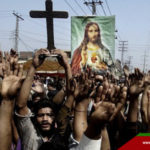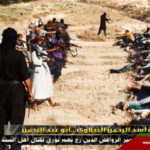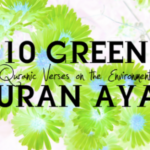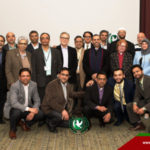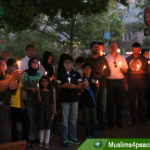by Nasir Shamsi
What is Islam? , asked an Arab. The Prophet Muhammad (s) replied, to obey Allah and to love His Creation. When asked why was he ordained as an Apostle, the Last of the Prophets (Khatam an nabi’iyyin), may Allah’s Blessings be upon him and his family, responded, with a smile: to perfect human conduct. On the Blessed Day of the Prophet’s Birth, shall we not take a close look at ourselves and examine closely our individual and collective lives, to see if we live up to his simple message ?
The Orientalists traditionally painted very negative image of Islam in the past. The old fear of the expanding Muslim Empire haunted the Western Christians. It prevented them from being objective about the Muslim faith and they did not refrain from discrediting Islam as a blasphemous faith and its Prophet as a pretender. Very unfortunately, they looked at Islam as a violent religion and a fanatical faith.
Thanks to the Information Age, the world is fast becoming a global village; people are getting to know one another better. The stereotypes about Islam must give way to a better understanding about the faith as well as its adherents. Lately there is an upsurge of books on Islam and translations of Quran in English and Spanish are available in any good Book Store. Yet surprisingly there are not any significant biographies of the Prophet available to the general reader. In order to understand Islam, a person needs to first understand the spiritual, not only the political and military aspects of the Prophet’s life, which have been generally the focus of the Western Biographers.
Who was Muhammad (s) ? Quran gives us a very clear description of his life before he had received his prophetic vision at age 40.
Did He not find you an orphan and give you shelter ?
Did He not find you unable to see and guide you ?
Did He not find you needy and suffice you ?
(al-Zhuha 93:6-8)
Born an orphan (his father Abdullah bin Abd al- Muttalib bin Hashim had died a few months before his birth), he was only 6 years, when his mother, Aminah also passed away. He grandfather, Abd-al-Muttalib took charge of him; he too passed away after two years. His most beloved uncle, Abu Talib now took him in his guardianship. He loved him more than his own children. He was only 10 when he accompanied his uncle, Abu Talib on a business trip to Syria. It was during this journey when a Christian Monk, Bahirah, looking at the young boy’s face, exclaimed that he discerned signs of his future greatness. He cautioned Abu Talib to be more careful about him because he was to receive a Divine Call.
The young Muhammad (s) earned good name in Mecca. He was called al-Ameen due to his integrity and great trust he always inspired in others. At 25, he accepted a proposal to marry Khadijah, a virtuous and righteous business-woman who had engaged him to watch her business interests in travels to Syria where he accompanied her trading caravans to sell things to the local traders. Impressed by the accounts of his honest and square dealings and an excellent conduct during the long travels,
Khadija offered to seek his companionship for life. The uncle, Abu Talib recited the nuptial sermon. Khadija remained his only wife until her death after 25 years of married life. She left behind the only daughter, Fatimah (s), the apple of her father’s eye. He loved her so much that every time she would enter the room, he used to stand up as a mark of respect, something unheard of in Mecca, a male-dominated society with little or no respect for women. She was wedded to Ali, the valiant son of Prophet’s loving uncle, Abu Talib. As destiny would have it, the progeny of the Prophet, known as Sayyids were to spring from this noble union.
The grief and sorrow of Muhammad was compounded by the fact that just three days before Khadija’s death, his uncle who had been his great support along with his wife, had also died. The Prophet used to call that year, Am al Huzn, the year of grief because of the loss of his two great comforters and helpers.
” Read in the the name of thy Lord who creates–Creates man from a clot, Read and thy Lord is Most Generous, Who taught by the Pen, Taught man that he knew not ”
It was ten years before the sad demise of Khadija and Abu Talib that Muhammad (s) had been revealed this most splendid message from God through archangel Gabriel during one of his solitary meditations in a cave on the Mount Hira in the precincts of Mecca. He had just turned 40. He had been asked to admonish the pagans of Mecca, the idol worshippers as well as his clan, the Ishmaelites, who had drifted from the Abrahamic faith, making it subservient to the rituals and superstitions.
They believed in Il-lah, one God but their belief was shallow. Their practical life belied their claim. A hodge-podge and plethora of rituals and sinister superstitions, essentially stemming from their convoluted belief that God had delegated the control and administration of the universe to others in whom he had vested all powers, such as healing the sick, granting children and removing famine and epidemic. This was the central idea of their faith, like the decadent societies of the yore.
They worshipped ordinary objects of stone and wood as holy. They would prostrate before them, circambulate them and offer meals and sweets and sacrifices to them. There were also among them who compounded their jahiliyya (ignorance) by associating the evil and good with the stars and that their destiny and their fortune was controlled by the movements of the star. This was no small act for a man coming from such precarious circumstances as him that the Prophet Muhammad (s), may Allah’s blessings be on him and his family, stripped not Mecca alone but the whole Arabia from such debasing idolatory and decrepit rituals immersed in superstition and ignorance, in just 23 years before he passed away at age 63 in Madinah.
The Prophet of Islam had to face great difficulties after the passing away ofKhadija and Abu Talib. The Meccans would chase him, yelling and ridiculingall the time. But it only strengthened the belief and conviction of theProphet even more and he continued his efforts unabated to help reform the immoral, corrupt and iniquitous society around him. His anguished and sorrowful soul turned to another place, Taif hoping people there would listen to him. But the Taifians pelted stones at him and forced him, while injured and bleeding, to leave the town.
In a state of utter helplessness, the Prophet turned to His Creator. As if to comfort His messenger in this moment of deep sorrow, an amazing thing happened. God called him as His own guest in the Celestial regions of the Heavens. This event is called Mera’j. Mera’j, the ascention of the Prophet Muhammad to the Celestial regions, the union of the Lover with the Beloved, is one of the most significant events of the last prophet’s life. It has fascinated the minds and hearts of the believers, including mystics and poets , over the last fourteen hundred years. Notwithstanding a small minority of believers who look at the Meraj of the Prophet as a spiritual, not physical experience, most Muslims–all Shias and majority of Sunnis–believe it was Prophet’s actual and physical experience. Mera’ j also has a special meaning and significance in the life of a Sufi. To him it is a real experience, the highest ‘ maqam ‘ a person could achieve in ‘ Salook ‘, a final meeting with the ‘ Mahbub ‘ , the Beloved; a Lover-Beloved union indeed ! Rumi, like other contemporary scholars believed in the actual physical transportation of the Prophet to the ‘ Sidratul Munta’h’aa ‘, the Highest Point.
” Glory be to Him who carried His servant by night from the sacred mosque (of Mecca) to the Distant Mosque, whose surroundings We have blessed, so that We show him some of our Signs. He alone hears all and observes all. ” ( Quran 17:1 )
The venerable poet-philosopher Iqbal , also a true ‘ Arif ‘ of Quran and a great admorer of Rumi , further confirms the generally held belief of most Muslims as well as Rumi, in this verse:
Mila hey nukta yehy Meraj-e Mustafa se mujhey
Keh alam-e bashriyat ki zad mein hai gardo’n
( The ascention of Mustafa has revealed to me that the heavens are within man’s reach )
In another of his poems, Iqbal says, sitaron se a’age jahan aur bhi nein abhi ishq ke imtehan aur bhi hain ( there are other universes beyond the Stars there are other trials of ishq (Love) ahead ! )
The traditions reveal that the Prophet narrated the accounts of his supernatural travel through the space onto the celestial regions unknown to man, as his personal experience, not as a vision or dream. This is quite evident from the shocking reaction of the Meccans, including some of his companions who, according to the Egyptian biographer of the Prophet, Mohammad Husain Haykal, turned apostate on hearing accounts of the Prophet’s Celestial travel. Accustomed to the routine and the ordinary, they were unable to fathom the esoteric nature of the Divine grace. For a Sufi, it is not difficult to comprehend the mira’ j because he knows that the norms are for the ordinary man. The love-journey is the journey to the extra-ordinary.
Prophets are no ordinary men. They are breakers of norm– the norm of the ordinary. Prophet Muhammad was no ordinary person. According to Quran , .he was the Seal of the Prophet hood. Being the Last Prophet, his prophet-hood was not confined to a certain people, certain place or certain time. God called him the ‘ Rahmatul lil A’alimeen ‘ —- the Blessing for the Universes; the jurisdiction of this ‘ Rehma ‘ extends to the galaxies, the farthest parts of the universe. That explains Iqbal’s almost proverbial verse, ” Sitaron se a’age jahan aur bhi hein “.
So no wonder, Muhammad was made to ascend into the space with a lightning speed unknown to his contemporaries and a continuing challenge for the future man. Indeed an eternal Miracle of the Prophet of the Universe ( Rasulal Thaqlain) ! A miracle that will never be equalled or humbled. The Almighty made his servant (abd) ascend into the Space, beyond the earthly hemisphere, farther than the galactic clusters of the yet unknown stars, deep into the Seventh Heaven, closest to the Ultimate Love (ishq-e haqiqi), ‘ at a distance of two bows length or yet nearer still ‘.
” Hence he (Muhammad) took an overviewing position while he was in the highest horizon. Then he drew nearer, and became pending. Thus was he at a distance of two bows-length or yet nearer still. Then He revealed onto His servant……”
The cosmic transcendency of the Prophet in timelessness puts him in a unique position in the universe; it also also points to the widening horizon of human knowledge of the universe. His bodily ascention to an infinitismally distant destination (maqam) where ” he was in the uppermost horizon (ufqul a’ala 53:7)., yet his return to his earthly home , all within a night , perhaps without any loss of time , points to possibilities, so far unfulfilled, of transcending time.
” For you (God) subjeted all that is in the heavens and on the earth, all from Him. Behold ! in that are are the Signs for people who reflect. ” ( Quran 45:13 )
This humble tribute to my Prophet (s) on his Birth Day is concluded with the opening lines of Syed Ameer Ali’s , “The Spirit of Islam ” ( a book I would sincerely recommend to everybody, particularly the Muslim Youth growing up in the west) :
” At the dawn of the seventh century of the Christian era, in the streets of Mecca, might often be seen a quiet thoughtful man , past the meridian of life, his Arab mantle thrown across his shoulders, his tailasan (scarf) drawn low over his face; sometimes gently sauntering, sometimes hurrying along, heedless of the passer-by, heedless of the gay scenes around him, deeply absorbed in his own thoughts–yet withal never forgetful to return the salutation of the lowliest, or to speak kindly word to the children who loved to throng around him. This is al-Ameen, the Trustee. ” He has so honorably and industriously walked through life, that he has won for himself from his compatriots the noble designation of the true and trustee. But now, owing to his strange preaching, his fellow-townsmen are beginning to look suspiciously upon him as wild visionary; a crazed revolutionist, desirous of leveling the old hallmarks of society, of doing away with their ancient privileges, of making them abandon their old creeds and customs. ”

